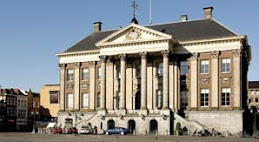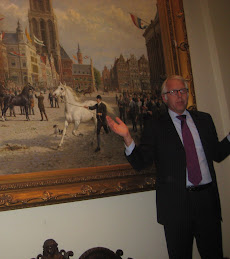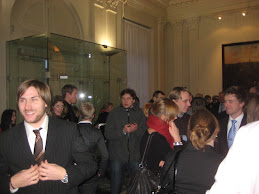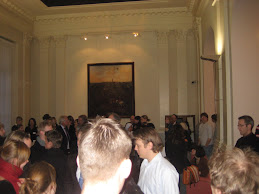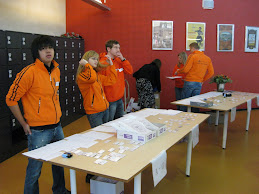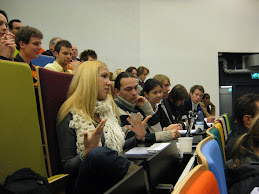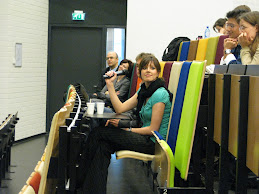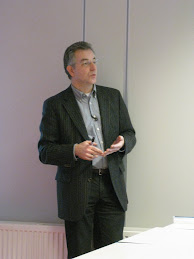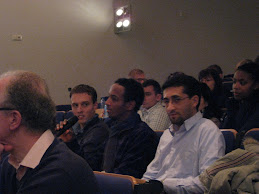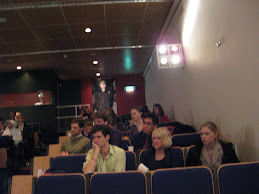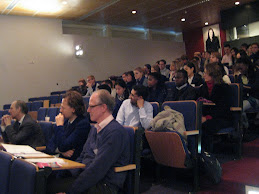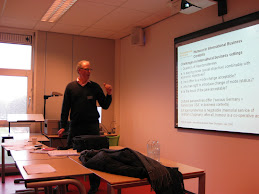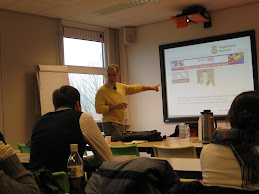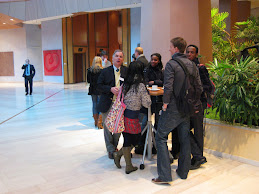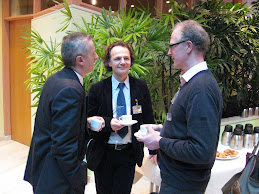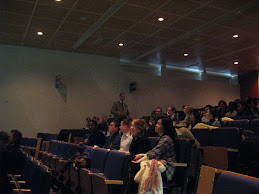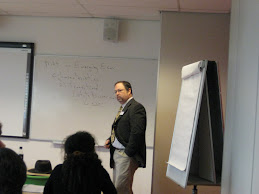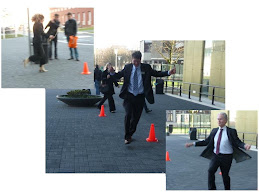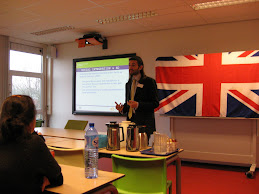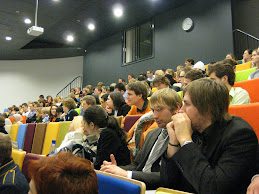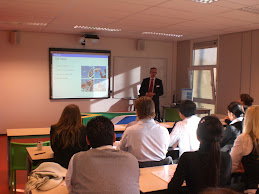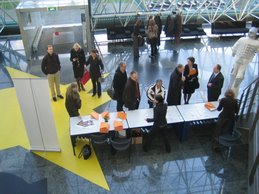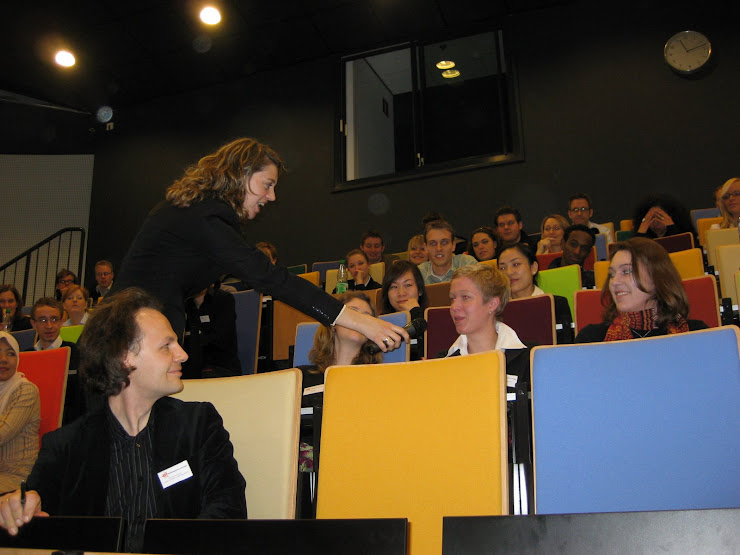Wednesday, February 4, 2009
FIRST INTERNATIONAL BUSINESS WEEK
With the first International Business Week a great tradition was born! Staff and students mentioned frequently during the IBW that this should be continued in the coming years. We had great guest speakers from our company contacts, alumni and partner universities. I would like to thank all speakers during the week for their great contibutions! Also, thank you students for your active participation!
Before long I will evaluate the week with a few 4th year students. Should we make this week compulsory for all 4th year students? Can we and should we expand it to a Hanze wide week? How can we get the 2nd year students involved as well? Should we work with a more specific theme for next year or is it better to keep it open to all contributions from our network?
Thank you speakers, students and guests for your inspiring and active contributions! You made the 1st IBW a great succes!
Sunday, February 1, 2009
FIRST INTERNATIONAL BUSINESS WEEK
Message by Kathy Ruiz
As every participant in the International Business Week, I was expecting with anxiety the speech of the mayor of Groningen – Mr. Jacques Wallace. The topic of his speech was ‘Groningen – city of talent’ and at first I was afraid that it sounded too cliché, but actually I was disproved when the presentation started and the mayor told us interesting stories from his rich experience and visits at the so called ‘sister’ cities.
It was quite interesting to learn that some of the sister cities of Groningen include Newcastle (UK), Graz (Austria), Tallinn (Estonia), San Carlos (Nicaragua), Murmansk (Russia), Oldenburg (Germany), Tianjin (China) and others. During the speech the mayor explained how Groningen was established and how it has evolved through the years. Ever since medieval times it has been an attractive area due to its crucial location – in a crossroad between a sea and a river and actually the only ‘path’ through the swampy province of Drenthe. That is how Groningen became an attractive port with routes to Scandinavia, the Baltic republics, and even Russia. Talking about Russia, as mentioned above, Murmansk is one of Groningen’s partner cities, and at first the relationship between those cities was based on exchanging technical know-how, mostly west towards east, but later Murmansk happened to be one of the Russia’s biggest energy ports. After this point, the relationship between these cities moved to another level – energy affairs.
Another interesting story of the speech was the relationship between Groningen and Bremen. At one of the mayors’ meetings of those cities, Bremen stated its position that the city is more interested in looking east towards Hamburg and Berlin and not to the West. Later on, the newly elected mayor of Bremen saw the potential of the northern part of the Netherlands and called a meeting where he clearly stated his interest in an active relationship with Groningen. Adding up the already existing relationship with Oldenburg, Groningen is more oriented to Germany more than towards the Netherlands.
To further show the importance of the sister cities, Graz, Austria adjusted their transport network replacing the busses and switching to a rail transport, particularly trams. Groningen followed the idea and there is an ongoing project for introducing a tram network in the city.
In short, Groningen has truly international outlook with developed exchange and trade of agricultural goods, services, know-how and actively developing position in the fair trade. The areas to improve in terms of internationalization and sister cities are to limit the numbers of the sister cities, to close the non-active relations, and to establish connections with a Muslim city.
-------------------------------------------------------------------------------------------------
Message from Joost van Slobbe
Franz Josef Gellert gave the second presentation on Thursday, on of the senior lecturers from IBS. Since 2001 he specializes in teaching marketing, economic and management. He is currently working on finishing his PHD, for which he researches the interaction between employers and employees, their mutual needs, wishes, demands and requirements. His presentation had a set-up, which existed out of two parts; Nomad workers and ageing workforce. During the presentation Mr. Gellert kept walking through the room in order to include as many people as possible to make the presentation lively. His talk was scheduled
It was clear that his research showed that Nomad workers are becoming more and more important nowadays. Nomad workers are people doing their work partly from home or locations other than the office, but they also must be able and willing to travel and be willing to work abroad. The labour market has been, and is changing faster and faster, due to this, the trend is to hire nomad workers. In order to become a nomad worker, having an extensive network is a must; therefore you off course need great communication skills!
In order to properly manage nomad workers, on needs to think out of the box to give people certain special circumstances to do their work. Make it possible for them to do their work in their own time and be curious about opportunities.
It can be concluded that nomad workers are: Highly skilled people, Flexible workers, employees of the future and definitely be more present in organizations.
For the second part of his presentation Mr. Gellert talked about the ageing workforces. This was just a very small part of the presentation and basically only covered the results of his research, which he had done at Volvo, Daimler and 6 residential homes. These researches where done by interviews or questionnaires and took between 1 and 4 years.
It is said that by 2040 one third of the work population in Europe is older than 60 years. Mr Gellert wants to find out whether the ageing workforce has a positive or negative effect on the companies’ turnover and efficiency. He showed that his research proved that the average age was very important at Volvo and Daimler but also at the Residential homes. Overall it was proved (for these three sectors) that a higher age had a positive effect on performance.
At the end of his presentation there was a Q&A session, which lasted for much more time than was initially scheduled. This proved that his research raises a lot of interesting questions, which Mr. Gellert was able to explain perfectly by the way.
-------------------------------------------------------------------------------------------------
Message by Joost van Slobbe
The last workshop of the IBS international business week I attended was one given by Mr. Paagman from Océ Nederland. Mr. Paagman was called in on very short notice since one of the other speakers was not able to attend the second workshop session of the day.
He started with a very short Q&A session during which he asked a lot of question to the students: if they knew Océ, if they knew what they wanted to do after graduation etc.. Then Mr Paagman plugged in a DVD with a promotional movie of Océ, after that we found at that Océ is a very big player on the printing and document handling market, he assured us that also the Hanze uses their machines. Documents are still used by all companies, and therefore there are plenty of business opportunities for them!
After his introduction he came to the overall direction of his presentation, which was to help us find out what we wanted to do after graduating. He did this by giving us a test also used by his company by applicants, made by Edgar H. Schein. This test was aimed to find out what our Career Anchors where. Career anchors refer to differences in what people look for during their career, and are based on the self-image of people. This image contains 3 of components: 1. Perceived talents and competences of one self (based on successes in work situations). 2. Perceived motives and needs (based on self evaluation, testing and feedback by others) 3. Perceived attitudes and values (based on a confrontation between personal and work/organizational values)
The test contained 40 statements, which we then had to rate 1-6, 1 being when the statement never applies to you and 6 being: the statementalways applies to you. The results had to be filled in at the end of the test, which gave the result of the anchor (Technical-functional competence, management competence, autonomy and independence, security/stability, entrepreneurship and creativity, service or dedication to the good cause, pure challenge, and lifestyle integration).After this there was a group assignment, in groups of 2 we needed to find out what the other student’ anchors where by looking at their past experience.
The result of the both tests gave me a very helpful insight in my own career anchors. Mr. Paagman provided his insights and showed why he (and Océ) where so enthusiastic about this method.
Thanks to the good, friendly and open way of presenting from Mr. Paagman, but also because of the interesting questionnaire, this presentation (from my point of view) was one of the best of this first IBS international business week.
-------------------------------------------------------------------------------------------------
Message from Kerstin Schulte
The first lecture I attended this afternoon was about marketing in emerging economies. The lecturer, John C. Sullivan is American who is currently a lecturer at one of the partner schools of the IBS in Tallinn, Estonia.
Topics in this lecture covered the identification and definition of emerging economies, characteristics of the market structure for entry into these markets, consumer buying behaviour and other marketing issues relevant to these special markets.
Emerging markets represent almost one-fifth of the world’s economies and have over four billion people living in them. They are characterised by a high growth rate and an increasing population. The main difficulty for marketers who enter these markets is often the uncertain infrastructure they are faced with, which affects the ability to enter these markets.
Mr Sullivan started by presenting the key characteristics of the so-called BRIMC economies (Brasil, Russia, India, Mexico and China). These countries are regional powerhouses, meaning they cause other economies to pull up and marketer can expand easily in these countries. These economies are transitional, which signifies that they often turn from state focussed to real market driven economies. While China has a more open attitude to foreign investment, India is still controlled by the state which makes it difficult for foreign marketers to enter. Furthermore, the fast growth of these economies results in fast change, which is a challenge to marketers due to the shorter time frame of developed plans and strategies. Important when entering new economies is to remember that they gain more and more political and economic power (also due to their resources). A marketer should consider this and play partner and focus on a good relationship.
A major characteristic of emerging economies is the high difference between poor and rich. Around 5-20% of the population are the so-called “elites” who have money, while the majority of the population consists of people who are concerned about the price and who tend to stick to local brands. When targeting the latter audience, it is important to choose the right medium, as they often do not have television for example and media such as billboards might be a more effective tool. The most effective way to reach these people is often a well expanded distribution channel. Often a product is marketed well, but this becomes useless if a product is not available. Mr Sullivan mentioned the example of Coca Cola who has maybe the best distribution channel and is therefore very successful in entering emerging economies.
In my opinion, the most important issue pointed out in this lecture is that understanding the consumers in developing markets opens up more opportunities for businesses which is especially important in these times of economic downturns. It was obvious that Mr Sullivan knew what he was talking about and he presented it in a funny and interesting way, which ended up in an exciting discussion.
Thursday, January 29, 2009
FIRST INTERNATIONAL BUSINESS WEEK
Message from Kerstin Schulte
The first lecture on the third day of the International Business Week was given by Jürgen Rigterink from the FMO, a Development Finance Company. The topic was „The effects of the Financial Crisis on Emerging Markets: from a Development Bank’s Perspective”. After Mr Rigtering introduced the FMO with a video and explained it’s function, he went into details about the past and current financial situation in emerging markets and some further consequences. Afterwards, he talked about the consequences for countries and gave an insight in what the crisis means for Africa, which is surprisingly not as immune as many people think it is. What the FMO does and where the bank invests became more clear after Mr Rigtering gave two examples: One of a wood and paper producing company in Argentina and another of an universal bank in Georgia. Finally, the lecture was rounded off with a Q&A session.
The second lecture was given by Michaele Carriere who all of you probably know and it was about the “Relativity – Domains of Ethics and Culture in International Business”.
Probably most of you have filled out a questionnaire about ethical and cultural competences during this year’s introduction phase. Michaele Carriere was responsible for this research as she investigated how effective the IBS is in teaching these competencies, by observing 1st, 2nd and 3rd year students. Mrs Carrier is still busy with this research and she presented some intermediary results. The fact that these findings raised many questions and ended up in discussions showed that this research was worth it and there is still a need for further investigation.
This afternoon started with a lecture on the global financial credit crisis given by Wouter van der Stok. After Mr Stok had already given an introduction about the current situation and the causes of the crises on Tuesday, this was already the second part of the threepart lecture. Therefore, he continued today with an analysis of the situation and talked about possible solutions for the crisis and a realistic time frame. Finally, he gave a brief comparison between the present situation and the 1929/39 depression. On Thursday the third part of this lecture will take place and I am already looking forward to what he will deal with.
This day rounded off with a lecture and a guided tour through the Gasunie in Groningen, a European gas infrastructure company. After some initial coffee in the reception hall we followed an interesting lecture given by Hans Coenen; the CFO of the Gasunie Germany. He talked about the transforming energy chain and gave an overview of past achievements, present changes and a future outlook of the Gasunie. The network of the company ranks among the largest high pressure gas pipeline grids in Europe, consisting of over 15,000 kilometres of pipeline. The fact that the European gas production decreases while the demand in Europe increases shows how dependent we are from supply sources. That is also the fact why gas can always be associated with power and politics. To make this clearer, Mr Coenen addressed the issue of the recent gas crises and the dispute between Russia and the Ukraine. Furthermore, the importance of an adequate infrastructure was pointed out, where Gasunie becomes involved. After the lecture which was rounded off with a Q&A session, we were divided into three groups of 25 people each and we were guided through the building. I was impressed by the consistent organic architecture – the whole building was full of plants and there was no rectangularity which underlined the natural aspects of the architectural style. The Gasunie-headquarter was built in 1993 and was designed by the architects Alberts & van Huut. It was chosen to be the most beautiful building of the Netherlands by the Dutch newspaper readers which I can definitely understand. I can hardly imagine that people actually work there and the trip was definitely worth a visit.
-------------------------------------------------------------------------------------------------
Message from Kathy Ruiz
Bram ten Kate opened the day by introducing the first guest- Jurgen Rigterink who is the Chief Investment Officer (CIO) of FMO, a Dutch financial company engaged in investing in emerging markets. The topic of the presentation was “The effect of the financial crisis on emerging markets.”
The presentation started with a movie which was about the FMO’s core business-investing in emerging markets. In the movie, the CEO of the company pointed out the basic attributes of the emerging markets, the countries where the company operates in, and how FMO differs from the commercial banks.
After the movie, Jurgen Rigterink took over and continued elaborating on the structure of FMO, types of emerging markets, and the short and long-term effects of the financial crisis on those markets. It was clear that the presenter was truly knowledgeable and he could draw attention. In addition, his message was sent across and triggered an interesting discussion and questions even amongst teachers.
It is important to point out that, despite the seriousness of the subject, Mr. Rigterink had sense of humor which appealed to the audience. Talking about the financial crisis and the ‘black swan’ events, he started the core of his presentation with the following question: ‘What is the difference between the Zimbabwean economy and Wall Street’ and the answer was: ‘There is some hope for Zimbabwe’.
Giving appropriate examples and telling more about his experience, of which he mentioned his work life in Kazakhstan and a recent meeting with the CEO’s of African banks in Washington, increased the spotlight on him even further.
The interactive nature of the presentation grew even more when Mr. Rigterink introduced two cases from FMO’s practice. They were about a paper-producing company in Argentina and a universal bank of Georgia. The follow-up discussion raised various questions to which the CIO gave complete and clever answers.
In a nutshell, the presentation was very professional, well conducted, informative, and provided real-life examples.
Wednesday, January 28, 2009
FIRST INTERNATIONAL BUSINESS WEEK on January 26th - 29th, 2009
Message from Kathy Ruiz
Heather White was one of our key speakers this morning. I was very anxious to see her presentation about forced labor and labor conditions in many of today’s big-branded suppliers. She addressed issues of child labor, forced labor, and health and safety violations in the supply chain of big Western companies, such as Nike. You won’t believe the number of forced labor in countries such as China, Thailand, and Malaysia. I’ve just been there, and I can’t imagine anyone living in such conditions. I’m very glad that there are organizations like hers who are trying to help.
This topic was extremely interesting, since she pointed out the many factors which contribute to these main issues. Key players are the suppliers themselves, big companies who try to reduce production costs, consumers who purchase such products, the government, etc. However, it seems that none of these are big contributors to the solution. Instead, it’s bigger organizations, like the UN’s ILO and UNICEF, and companies like Verite and New Standards, who try to get things right.
Ms. White’s simple remarks made a great impression on me. When she showed us the conditions on which some people live, all I could think of was: at what cost can someone live like that? I imagined Tiger Wood’s $22 million dollar contract with Nike, and just asked myself: How can he wear a shirt that supports the lifestyle and condition of its creators, and do nothing about it? It’s like telling his fans “I have millions, that’s all that matters”. I was thinking: what if, instead of taking the money, he tells Nike he’ll represent them for a year as long as they invest that money in improving the working conditions for those people. Then, whenever he wears his shirt, he would be supporting livable working conditions. I’m sure Nike representatives would agree and smile, those thousands of workers would smile, and he would smile in return.
But coming back to reality, why should he be the one doing something about it? Isn’t the company supposed to take care of this and not partner up with businesses with poor labor conditions? Yet again, isn’t the government responsible for making sure decent labor conditions are enforced? This is obviously not working, so then maybe the regular sporting consumer is to blame for wanting to keep low prices and still purchasing such goods? Trying to find who is to blame is an endless, vicious circle, and it feels like the right solution, is no solution at all.
A better question is: Who can change this? For sure, everyone can. Heather is evidence that a change can be made; she is an inspiration and a great example for today’s society. After all “Impossible is nothing,” right? All you have to do, is just do it.
-------------------------------------------------------------------------------------------------
Message from Kerstin Schulte
Internationalization of entrepreneurial small and medium size firms
Nowadays, we will possibly switch companies around eight times during our career ladder, so the chances that we will be working for a small or medium sized company (SME) at some point of our career is high. That is why I decided to attend the lecture “Internationalization of entrepreneurial small and medium size firms” by Andreas Zaby, a professor at the FHW Berlin.
Mr Zaby started his lecture by giving some relevant data background. As many SMEs focus on niche market products, the possibility of export increases. Often products are targeted at a small amount of customers, which are spread around the world. Therefore, 60% of the total revenue of SMEs in Germany comes from exporting activities.
Although China is climbing up the ladder, Germany is still on top of the list of being export leader. Around 60% of these exports are generated by large companies (little in number), the rest is generated by SMEs or small companies (whereas this are the most in number).
Interesting to see is that German mid sized niche product world market leaders are often located within clusters. An example would be the automotive sector which clusters around Stuttgart with Porsche, Mercedes and suppliers of components such as Bosch, while the publishing and banking sector clusters around Frankfurt am Main. Of course, this phenomenon of agglomeration is visible all over the world. Although companies compete globally, there is strong evidence that the location continues to play a crucial role in the competitive advantage a company has (due to the fact that input, such as raw material, capital or knowledge is available which lowers the costs). This role of the location in the competitive advantage is also known as “Globalization Paradox”. Whereas traditionally, a company that internationalizes follows different stages; the more recent approach for a company is to “leapfrog” the different traditional stages and go global right after foundation.
After giving this theoretical input, Mr Zaby presented some examples of born-global game developer firms. These are mainly clustered in Berlin due to the fact that there are leading institutes located for people specialising in game development (Game academies). Therefore, Berlin has a great potential of programming talents that are able to combine the technology with creativity and design elements.
Mr Zaby’s forecasts predict that in future more and more SMEs will go global as the barriers that create reluctance are becoming easier to overcome. Furthermore, the amount of SMEs in general is expected to increase as many large companies shrink in size due to outsourcing activities.
All in all, this lecture gave an interesting insight in current developments of small and medium sized enterprises and I was not aware of the tremendous growth, these companies are currently experiencing.
-------------------------------------------------------------------------------------------------
Message by Joost van Slobbe
The second day of the IBS international business week, again was full of interesting workshops and presentations. I did not expect very much from this day, mainly because the speakers/representatives from the different companies weren’t that well know, I must say however that this day was more interesting than the first day.
Heather White, from New Standards, kicked of the day. She gave a very interesting and confronting presentation on the subject social and environmental challenges in a rapidly globalizing world. Her presentation, mainly was focussed on the labour conditions for people working in countries such as China, India etc. and off course on the companies responsible for this, like Nike. Next to that there was a focus on the environmental consequences of irresponsible management decisions. As an example she gave the disaster in Bhopal in 1984 when 42 tons of toxic gas leaked.
After that Mr. Diederich Bakker from the International Business School at the Hanze University gave a presentation on vertical brand portfolio management. Mr. Bakker is one of the key-marketing lecturers at IBS, he gave a very lively and interactive presentation focussed on the differences between national brands and private labels.
During the 50-minute break there was the possibility for students to talk to some recruiters to have an informal talk and to discuss future career opportunities.
The afternoon session was divided into two parts of 1.5 hours each. We had the possibility to choose between five different workshops/presentations each time.
During the first session, some universities like the London South Bank University, the Catholic University of Lublin John Paul II and the Fachhochschule Berlin provided interesting presentations covering sustainable development in business, internationalization and the use of proverbs. Representatives, from the Holland Trading Group and ECOS Sustainable improvement, where also present to give interesting workshops.
During the second session three of the same speakers presented their ideas to a different group of students, but two where replaced byothers. Mr. Wouter van der Stok from IBS began his trilogy on the Global Financial Crisis, which he will continue Wednesday and Thursday. Furthermore, Agita Donina, from the School of Business Administration Turiba told about the MBA program Travel & Tourism given at their University.
Tomorrow, again a very interesting day is scheduled with many different speakers and a nice trip to the Gasunie!
Tuesday, January 27, 2009
FIRST INTERNATIONAL BUSINESS WEEK on January 26th - 29th, 2009
Message from Kathy Ruiz:
Hi! My name is Kathy Ruiz, I come from Mexico and I'm currently in the 4th year of both my studies of International Communication and International Business.
Just when you thought you’re finally done with exams and off to a holiday, IBS came up with another new module worth one more credit. This week, the International Business Week will be taking place at IBS, with speakers from different countries addressing different issues in today's business world.
Today, the International Business Week kicked off with a good start. I was surprised to find that the lectures are starting at 10:00am (yay!) instead of 8:30am, which is most likely the case. At 9:30am, I went to check-in at the new Willem Alexander Sportscentrum; it was the first time I was in the sportscentrum.
The event was opened by Paul Ganzeboom, the Dean of IBS, who highlighted the importance of this week's lectures and the outstanding position of the IBS program at Hanze. Afterwards, some lectures were carried out by Cor de Ruiter (board of directors), Jan Kets (lecturer of IBS) and representatives from World Essence. I particularly enjoyed the presentation of intercultural differences by Ad Fernhout, World Essence founder, and Margaret v.d. Wetering, an IBS alumna currently working at World Essence. They were very enthusiastic and gave extraordinary examples of cultural difference situations by reenacting personal experiences of culture shock. They filled the room with interest and laughter, and established a great connection with the students, since many have gone through intercultural challenges while being abroad. At some point, they asked the audience about their own experience with the "equality" dimension of Dutch culture. I gave an example of my own personal experience during my internship and they impersonated this situation quite well, where Ad reenacted my character. Everyone found this quite funny, including me.
During the lunch break, we headed towards the atrium, and on the way there was a “War Child” campaign outside the tower. For 1 euro, you could participate in a “jump rope race” for the cause. Ad, Desiree(World Essence), Margaret, and Bram ten Kate (IBS Team Manager) went for the challenge, and all got a chocolate for their efforts. It must’ve been tough for the girls to jump rope on high heels—respect!
In the afternoon sessions, I had a lecture on the cultural aspects of doing business in China, with Linda van den Broek from the Kentfort Company. She gave nice descriptions and examples of Hoftede's cultural dimensions in both China and The Netherlands. It was nothing really new to me, since I've just finished a China specialization at International Communication, but I believe this is a very interesting topic for first-time listeners. I highly recommend it to those who have already experienced a big culture shock, since it will help them understand the 'why' aspect of cultures.
The second afternoon session I attended was given by Jacques Hémon, where he explained the concept of international law and its role in business. It was very interesting to see the complexity for international companies to deal with other international organizations.
Take note: when doing business with the U.S. choose the California law system, where basically everything is possible (‘The Governator’ should know) ;).
It was a good day, though now it’s time for some ‘lekker’ Mexican dinner. Let’s see what tomorrow brings… ¡Hasta mañana!
-----------------------------------------------------------------------------------------------
Message from Kerstin Schulte:
An international career in Philips
The first lecture I attended during the International Business Week was “An international career in Philips”. The lecturer Frank Snellens studied economies and labour law and is now working as a Human Resource Director in the Consumer Lifestyle Department of Philips in Drachten.
Philips Royal Electronics was founded in 1891 and is one of the largest global electronics companies. It’s main drivers to growth is a solid R&D fund which helps in designing advanced and easy to use products. Probably most of us get regular in touch with one of these products – let it be a shaver, a Senseo or an MP3-player. The company is active in three different sectors: Healthcare (mainly B2B-business), Lighting, and Consumer Lifestyle (shavers, domestic appliances etc).
Philips is constantly looking to increase it’s talent pool by focussing on diversity. The employees experience this diversity not only on a cultural level, but also by the possibility to change sectors and collect a broad range of experiences within different market sectors. The company puts a focus on the so-called 2-2-2 experience which means, that high potential employees should have the opportunity to work in at least two different geographic regions, in two different market sectors and be able to work cross-functional, thus collect experiences in different departments.
Philips calls itself a people-centric company. In order to guarantee high potential employees the company makes use of a so-called “Leadership Competency Framework” that helps measuring all employees of the organisation. This means that every employee is measured under the following points: He should be able to create innovative strategies, inspire commitment, leverage capabilities, champion people’s growth, drive for results and pursue market insights. The latter point shows the companies customer focus: constantly customers are observed and interviewed to discover their needs and all products are created according to these needs.
In order to find talents, Philips offers so-called “European Business courses”, which are entry assessments for high profile employees. After applying via the company website, interested graduates will be selected and interviewed via telephone. Then, 30-35 graduates are allowed to enter the European Business Courses which take place in different departmental sectors (Marketing, Finance etc.). The ones that pass the assessment tests, will attend an intensive three-day course, where they are constantly observed in order to be finally rated by different managers. All participants who score over an 8.0 during this course are being insured to get a job at Philips. When a graduate gets a job, Philips insures every employee the opportunity to climb the career letter by a special procedure introduced by the company called “Talent Identification”. During this procedure employees are asked to rate their colleagues. Afterwards, the outcome is shared with the respective employee and a personal development plan is prepared together with a supervisor.
All in all this was an interesting lecture about the Management Career Options at Philips and everyone who is inspired now, should have a look at www.philips.com and check the Career Sector for further information.
-------------------------------------------------------------------------------------------------
Message from Joost van Slobbe:
Hi all,
My name is Joost van Slobbe, during the first IBS international business week, I will describe some workshops/presentations, which have been given. Today I will talk about the workshop given by Mr. Snellens from Philips. First I will introduce Mr. Snellens, followed by a description of his presentation.
Mr. Snellens studied economics and law at the HogeschoolEnschede from which he graduated in 1989. After that he had a series of jobs as a HR manager at companies such as Vroom en Dreesman, FMO and KPMG. Later he worked as an interim manager for Yacht and ended up at his current employer Philips in October 2003. Within Philips he has worked at many different departments but currently is responsible for the Philips site in Drachten, where they havethe T&D groups Shavers, Grooming, Small Household Appliances and Advanced Technology,production site for Shavers and a Logistic centre.
The presentation, which was given by Mr. Snellens, focussed on an International Career at Philips. Philips was founded in 1891 in Eindhoven, The Netherlands, but currently has its headquarters in Amsterdam. The company hadsales in 2007 of around €26,793 million with some 134,200 employees worldwide.
The way Philips does business is centred around the customer, they want to make live easier by looking at what customers want and making sure that their products can be used without having to read the manual first. That is why they changed their old slogan “Let’s make things better” in 2004 to “Sense and Simplicity”.
A good example of a product which fits this description, is the Senseo coffee machine, which is very easy to use but has a very sophisticated interior.
Philip has designed a special program in order to improve their management, but also to get new talent, or high/top potentials, to work at Philips. This is focussed on the following points:
· Grow people in becoming good leaders.
· Improve diversity (try to attract more women for management functions).
· Attract new (international) talent.
· Simplicity
· Make the step from good to great.
Mr. Snellens also showed how Philips handles its selection of new talent, what the steps are to start a career at Philips and what is expected from the employee, but also what he or she can expect to get in return. A special 3-day program is designed by Philips to make sure they get new talent in house, this is called the Business course. During these three days, an opportunity is given to show that you have what it takes to become a future leader at Philips.
The 1.5 hours during presentation gave a very clear and interesting insight on the career possibilities at Philips and showed that they are one of the top Global players in their field.
Thursday, May 10, 2007
Message from Manila by Douwe Henny


Hi,
I am Douwe Henny from the Netherlands and I am currently doing an internship in Manila. I have been here now for 3 months and I have been enjoying myself here incredibly and I will tell you why…
First of all my internship. I am working at Headway Holding, a consultancy company that has been set up about 3 years ago. Headway Holding exists of 3 different departments, Headway Dynamics, Headway Business Logistics and Headway Business Services. I am working within Headway Business Services (HBS). HBS helps companies from abroad establishing a subsidiary in the Philippines. That means we help our clients with program management. Within 8 months we are able to set up a subsidiary from scratch to its operations. That involves registration at government agencies, finding an office space and providing designs, contracting suppliers and managing the build out. In the mean time we provide our clients with estimated cost calculations of the build out, timelines and we monitor the whole process.
At the moment HBS exists of 5 employees, including me. That is what makes my internship so interesting. The company is very small and I have great responsibilities. In bigger companies I would never have these responsibilities that I have now. Because there is a lot of work that needs to be done, I work at least from 9am till 7pm. I sometimes had working days of 14 hours, which is crazy, but nice to experience. Anyway, HBS is growing and it is good to see it gaining more clients. Despite that we are still very small, we experience that there is a great potential for HBS as investing in the Philippines is very popular.
Furthermore next to the internship, the Philippines itself is an awesome country! It exists of 7000 islands and you are able to travel easily by boot or by plane for only a few bucks. The nice thing here in my company is that as long as you do your thing and show a lot of effort, they will not make a problem giving you some days off. In these three months I have been to Boracay for 4 days, to Negros for a week (islands in the middle of the Philippines, called the Visayas) and I have made a trip to Indonesia for 4 days. And I am actually planning to travel more. Things you can see and do here are amazing: waterfalls, volcanos, rice terraces, beautiful white beaches, diving and a lot more!
Manila itself is a city of 10 million people. The city is very big en polluted and cars are driving without applying any rules. But more important, the nightlife in Manila…it is great! There are a lot of bars, hip and trendy nightclubs, and there are always parties during the whole week. I am going out about 3 times a week which I can still combine with work. Also what I have noticed is that there are a lot of international people living and working here. So I have been able to build up a network of both Filipino and international friends.
My overall impression is that the culture, the nightlife, the internship and the traveling possibilities make my stay here in the Philippines great!
Greets from Manila,
Douwe Henny
Monday, April 16, 2007
IBS student Elmar Friedrich: Greetings from China!
 Since March 2007 I am working as an intern in the National Sales Department for BMW China. First of all, BMW is a great company. Especially in China, an intern at BMW is treated as a regular foreign employee with all related responsibilities and challenges. In daily business this leads to a very interesting and tough job: I have to start early in the morning and come home earliest 7 pm., sometimes even later. But that is not a result of my job restrictions but of interesting and very challenging projects.
Since March 2007 I am working as an intern in the National Sales Department for BMW China. First of all, BMW is a great company. Especially in China, an intern at BMW is treated as a regular foreign employee with all related responsibilities and challenges. In daily business this leads to a very interesting and tough job: I have to start early in the morning and come home earliest 7 pm., sometimes even later. But that is not a result of my job restrictions but of interesting and very challenging projects.I assist an international team of Area Managers and, in addition, I have projects of my own. In my current project, I am planning a dealer incentive for the best sales consultant of each dealership in the whole of China. I am the project leader and responsible for everything: from deciding on a location to inviting the best dealer of every BMW dealership in China. This requires cultural tactfulness and a high degree of flexibility. On a more practical note, it means many business trips through China to get firsthand impressions of different event-locations and the expectations of highly qualified sales consultants.
In addition, I support my colleagues during their daily business, for example by arranging the re-allocation process of a specific car model from one dealership to another. Especially these tasks make my internship incredibly interesting. You never know what to expect today!
But of course working in China also brings along some difficulties. First of all, culture and language are a serious problem when living and working in Asia. Many Chinese, even general managers of companies, can not speak English. For my part, I don’t speak Mandarin very well but after studying one semester in Taiwan and thanks to my Chinese colleagues, I have always been able to understand the other side and express myself in a proper way.
From my point of view, working in a different culture is a great experience. Thanks to my university I was very well prepared for this year abroad. Not only the knowledge gained during two years at IBS but also working with and in international teams has provided me with the cultural sensitivity needed to be successful in Asia.
So if you want a challenge, Asia is the place to be!
Best wishes,
Elmar Friedrich
BMW China

